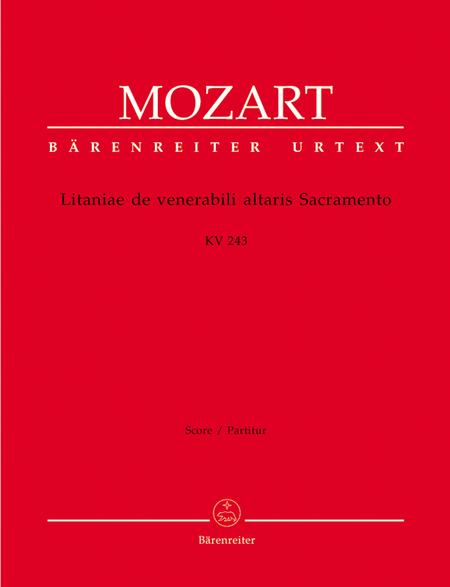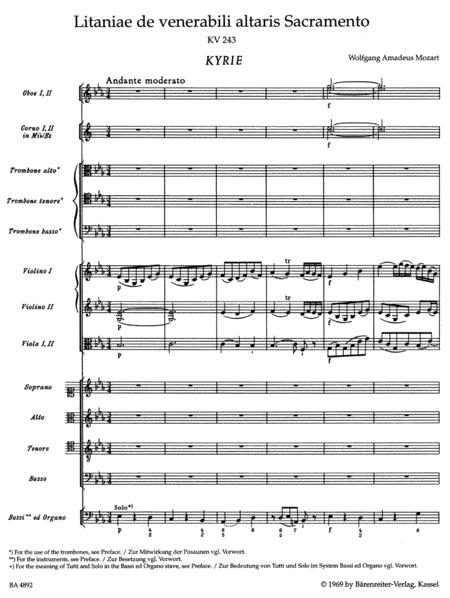Litaniae de venerabili altaris Sacramento E flat major, KV 243
-
Ships in 1 to 2 weeks
Details
Description
SKU: BA.BA04892
Composed by Wolfgang Amadeus Mozart. Edited by Hellmut Federhofer. This edition: urtext edition. Paperback. Barenreiter Urtext. Score. K. 243. Duration 35 minutes. Baerenreiter Verlag #BA04892. Published by Baerenreiter Verlag (BA.BA04892).ISBN 9790006459520. 31 x 24.3 cm inches. Key: E-flat major.
Besides the Masses, the Requiem and the Vespers, Mozart’s lengthier church-music works also include four Litanies, all composed in Salzburg. After his first Italian journey (13 December 1769 to 28 March 1771), Mozart returned to his post as archiepiscopal “Konzertmeister”. Undoubtedly inspired by what he had just experienced, he wrote the Litaniae Lauretanae (Loretian Litany) K.109 (74e ), his first work in this genre, which is dated May 1771. The Sacramental Litany K.125 was completed in March 1772, between Mozart’s second Italian journey (13 August to 15 December 1771) and his third (24 October 1772 to 13 March 1773). During a longer stay in Salzburg in 1774, between his travels to Vienna and Munich, Mozart composed the second Loretian Litany K.195 (186d), which was followed by the second Litaniae de venerabili altaris Sacramento K.243 in March 1776. This latter work represents Mozart’s final and most extensive contribution to the Litany genre.
The form of the Litany was found already in early Christian times. Like its name suggests, it is a prayer of supplication, with a steady repetition of acclamations; however, with regard to its manner of performance, it is also a kind of responsory prayer. While the Loretian Litany is an eloquent expression of Marian devotion, the Sacramental Litany is a testimony of praise and veneration of the Eucharist and a recognition of its salvational effect.
About Barenreiter Urtext
What can I expect from a Barenreiter Urtext edition?
MUSICOLOGICALLY SOUND
- A reliable musical text based on all available sources
- A description of the sources
- Information on the genesis and history of the work
- Valuable notes on performance practice
- Includes an introduction with critical commentary explaining source discrepancies and editorial decisions
... AND PRACTICAL
- Page-turns, fold-out pages, and cues where you need them
- A well-presented layout and a user-friendly format
- Excellent print quality
- Superior paper and binding


 Share
Share